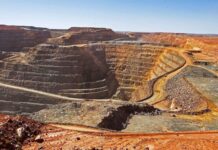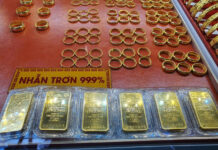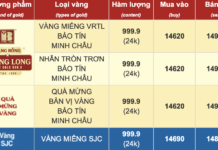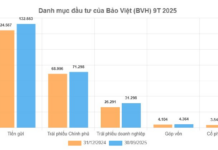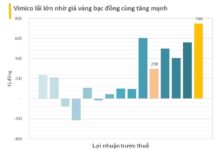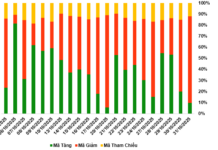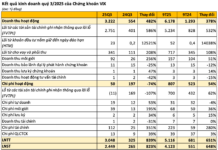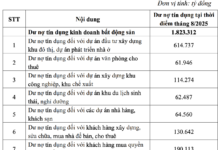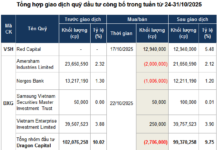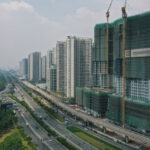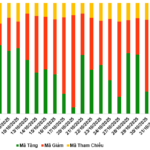In recent times, land auctions in the outskirts of Hanoi, such as in Thanh Oai and Hoai Duc districts, have witnessed a surge in the number of registrations, with winning bids skyrocketing, sometimes even tens of times higher than the starting price. These developments raise serious questions about possible speculation and profiteering.
Are Participants Creating an Artificial Frenzy?
According to the Vietnam Real Estate Brokers Association (VARS), while the proceedings and outcomes of these land auctions are unusual, they are not entirely unexpected.
Dr. Nguyen Van Dinh, President of VARS, offers two explanations for this phenomenon. Firstly, since mid-July, there has been an expectation that capital will flow towards land auction types, particularly in urban areas and residential zones, as local authorities organize multiple auctions to boost budget revenues. This form of investment offers a ‘clean’ land option, free from disputes and litigation, with clear land titles, infrastructure, and the potential for immediate construction for business or rental purposes, generating a monthly cash flow.
This is especially appealing given Hanoi’s lack of new projects in recent years and the anticipated scarcity of land supply due to the new Business Law’s prohibition on land subdivision and plot sales in 105 cities and towns. Meanwhile, the demand for real estate, driven by both residential and investment needs, remains robust and continues to grow.
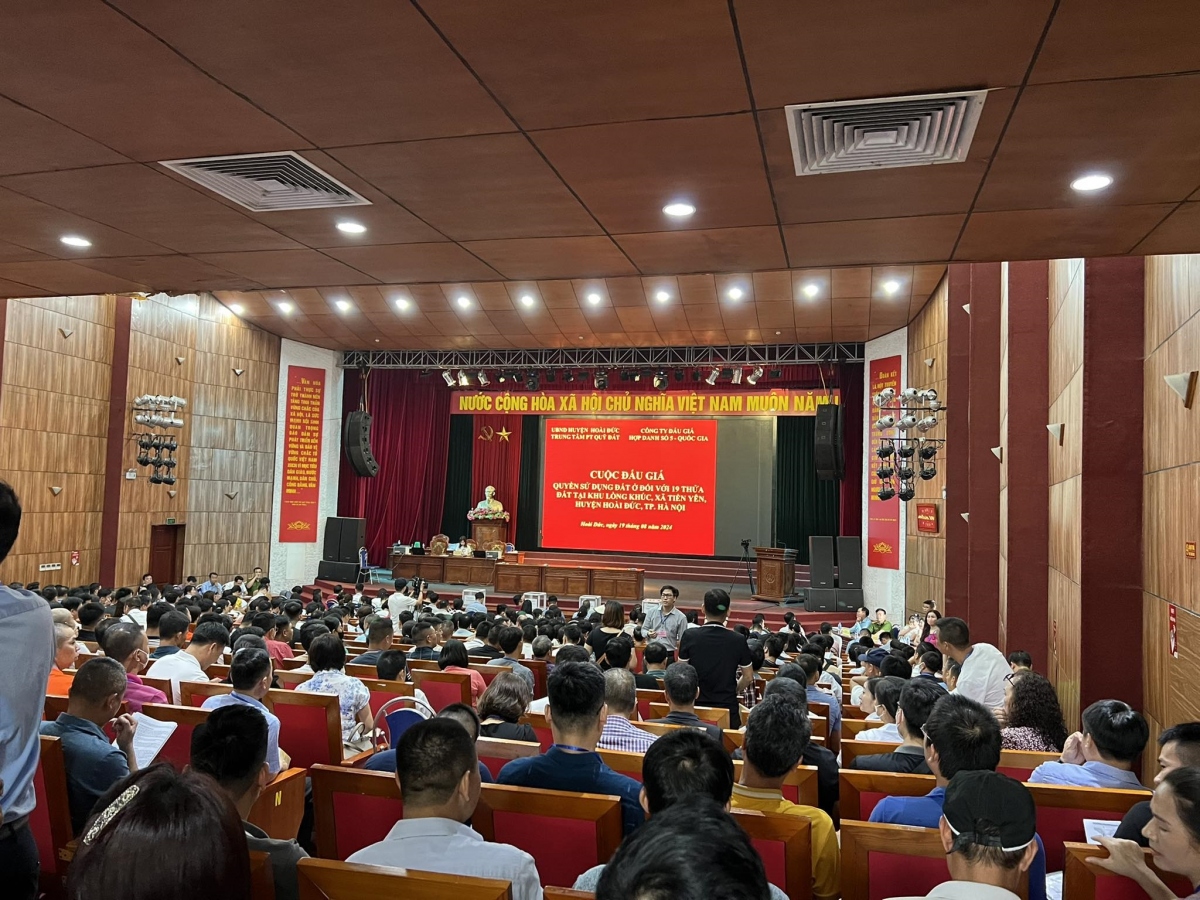
Land auction in Hoai Duc district, Hanoi (Illustrative image: KT)
Secondly, the dramatic increase in winning bid prices, though seemingly abnormal, can be attributed to the low starting prices. Specifically, the previous regulations allowed for the involvement of consultants in determining land prices. The land auction held on August 10 in Thanh Oai district also engaged consultants, who set the starting price between VND 40-45 million/m2.
However, the current Decree 12 (amending and supplementing Decree 44 guiding the implementation of the 2013 Land Law) is now Decree 71 (issued by the Government on April 27, 2024), which eliminates the option of hiring consultants. Instead, it employs a coefficient K multiplied by the city’s land price frame.
According to Decision 46 dated July 18, 2024, of the Hanoi People’s Committee, the adjustment coefficient for land prices in Thanh Oai district is 2.35. The applicable land price frame, issued in 2020, ranges from VND 3.6 – 5.3 million/m2. Therefore, multiplying these two figures results in a price range of only VND 8.6 – 12.5 million/m2.
The combination of a safe investment option, a low starting price, and a modest deposit (VND 100 – 200 million) creates a highly attractive opportunity for buyers. It is, therefore, not surprising that these auctions attract thousands of registrations. Such a significant number of participants is entirely reasonable.
“While the significant increase in winning prices reflects the actual imbalance between supply and demand, with the number of participants far exceeding the number of land lots available, it is abnormal for land in a peripheral locality with unremarkable infrastructure and amenities to reach a price of over VND 100 million/m2, comparable to land prices in urban areas and densely populated regions,” said Dr. Dinh. “This outcome is a result of unhealthy intentions.”
Many investors participating in these auctions are professional land auction bidders who often aim to ride the wave of price increases. They are uninterested in the actual value and are instead focused on reselling their winnings immediately to make a quick profit or are willing to forfeit their deposit if the market does not respond as expected,” he added.
There may also be a more dangerous intention, which is to create a land price frenzy. These individuals exploit the auction deposit process to inflate prices for related land areas, even going as far as finalizing the payment at the winning price to legitimize it and use it as a basis for hiking land prices in outlying districts, potentially leading to an artificial price surge,” Dr. Dinh further analyzed.
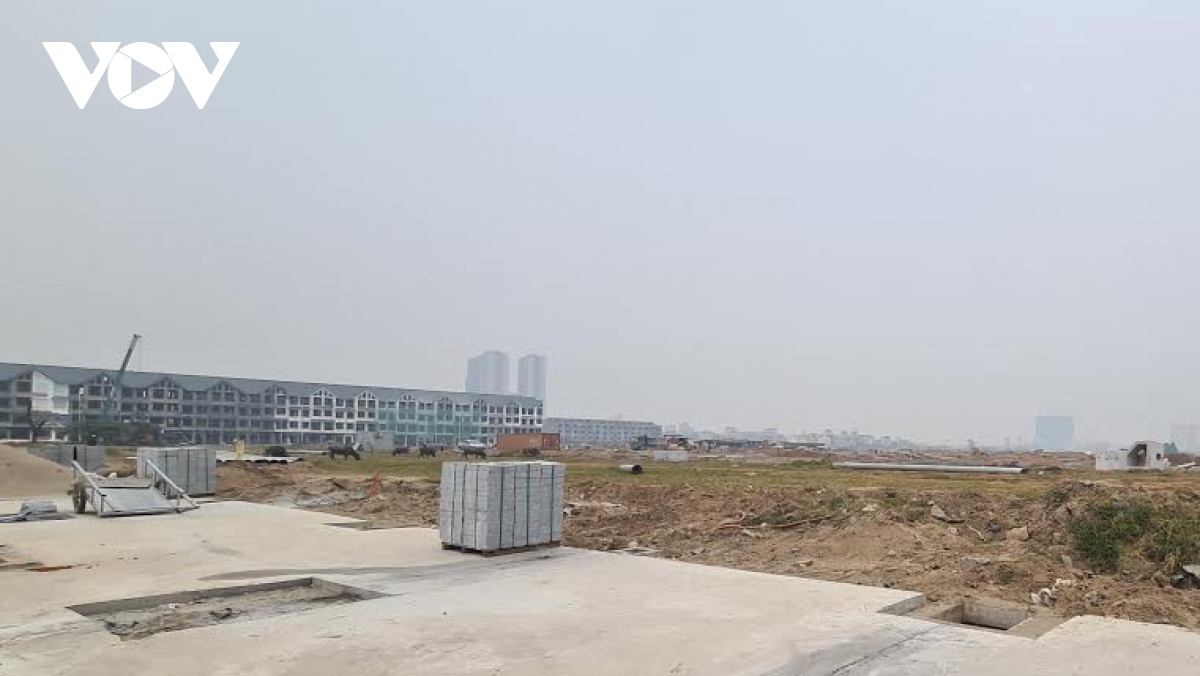
Rising land prices negatively impact the real estate market
Negative Impact on the Real Estate Market
The consequences of these situations are higher real estate prices, making homeownership even more unattainable for locals, especially young people. The soaring auction prices, which far exceed the actual value, not only complicate asset valuation for subsequent auctions in the auction-holding locality but also affect many other parts of the country.
With the media coverage of these events, the fear of missing out (FOMO) will kick in, and investors will anticipate further price increases, leading to risky decisions. This mindset is further fueled by the expectation that the upcoming adjustments to land price frames in various localities will indirectly push land prices higher. As a result, many investors may end up with trapped capital, creating vacant land areas and negatively impacting the healthy, sustainable development of the real estate market and the local economy, as capital becomes stagnant in land instead of flowing into other economic activities.
There are suspicions of speculation and price manipulation, but in reality, similar to what happened in the Hanoi apartment segment in the past, even if buyers forfeit their deposits, it is challenging to identify and address speculative and manipulative behaviors. In a market economy, the right to determine the selling price rests with the asset owner, and transactions occur based on the principle of willing buyer, willing seller. They can back out of a deal without providing justification, and it is inevitable for prices to rise when any commodity is scarce in the market.
Even with new regulations in place, the fervor surrounding the aforementioned land auctions is expected to persist for a prolonged period. While the supply will increase as local authorities conduct more land auctions, the starting prices will remain low because the land price frames determined by the Provincial People’s Committees, as per the 2013 Land Law, will continue to be applied until December 31, 2025.
According to VARS, ensuring transparency in auction activities and addressing speculation and price manipulation require a shift in the mindset regarding homeownership. Housing should be viewed primarily as a place of residence, fulfilling the living needs of individuals, rather than an asset for accumulation.
By imposing taxes and targeting those who accumulate or speculate instead of those who purchase real estate for residential or business production purposes, the element of asset accumulation can be reduced. The tax rates could be progressively increased for real estate transactions where the seller has a short holding period or if the real estate owner does not utilize the property for business activities or construction after acquiring the land…
The Ultimate Guide to Housing Management: Overcoming Limitations and Inefficiencies
In the afternoon of May 21st, Deputy Prime Minister Tran Hong Ha chaired a national online conference to discuss and provide feedback on the draft decree detailing several articles of the Law on Housing regarding home ownership, development, management, operation, and state management.




